Trying to round out your collection of home gym essentials? From squats to overhead presses, the best slam balls have the resistance and versatility to help build strength throughout your entire body. You can slam them against a wall, the floor, or that roach crawling over your sneaker, making them a great tool for functional training and cardio. These CrossFit favorites are often overlooked pieces of fitness equipment that can help build both upper and lower body power, making you a more explosive athlete.
Slam balls all serve the same function, but there are some differences that may impact how and why they’re used. Dead bounce slam balls can be used when doing wall throws, while slam balls with tread have the kind of grip that should prove helpful during partner drills to help with catching. We’ve rounded up the best slam balls on the market to help you choose which one is right for you and your training.
The 6 Best Slam Balls of 2024
- Best Overall Slam Ball: REP Fitness Slam Ball
- Most Versatile Slam Ball: Titan Fitness Rubber Tread Slam Ball
- Most Durable Slam Ball: Fringe Sport Slam Ball
- Best Slam Ball on Amazon: Yes4All Slam Ball
- Best Slam Ball for Grip: TRX Slam Ball
- Best Budget Slam Ball: Living.Fit Slam Ball
How We Tested and Chose the Best Slam Balls
Whether you are slamming it on the ground, throwing it at the wall, or tossing it to a partner — always in love, never in anger — slam balls shine in gyms for their simplicity and versatility. While these are relatively straightforward pieces of equipment, we dove into the details to sort out which slam ball might be best for your training.
The BarBend team of certified personal trainers, CrossFitters, and weightlifting coaches has personally owned and used 9 slam balls, and we are sharing our hands-on experience to inform your decision. Across 10 categories — like durability, aesthetic, and overall value — we assigned ratings of 1 (lowest) to 5 (highest) to give you a sense of what it’s like to slam these bad boys in the name of fitness. Here are a few of the factors that helped us choose the best slam balls.
Price
When we put together our list, we were mindful to include options that would be accessible to most athletes. Similar to dumbbells or kettlebells, the weight of the slam ball is the main factor that determines their price. Our picks range from $20.99 to $320, with options that satisfy different modes of training.
If you can accomplish a lot of your training with just one or two slam balls, your best bet may be closer to the $20.99 end of the range, but anyone building a home gym may consider investing in a set. To help you get the most value out of your purchase, we chose slam balls that are available as individual pieces, small sets of two or three, and large sets to fit the needs of the most athletes.
Durability
Slam balls are going to take a lot of punishment. Their entire existence hinges on their ability to withstand huge amounts of force, so many are reinforced with impact-absorbing shells to help them last for years. When we put these to the test, we took note of their shells, the stitching, the air valves, and the included warranties to give you a sense of how long you can expect your investment to last.
Grip
We also made sure to note how grippy each ball was, as a textured option can serve a different purpose than a smoother ball. Some slam balls offer lightly-textured shells that, compared to more rigid options, can feel relatively smooth. Options with more rigid textures can be easier to grip during sweat-drenched sessions, but some may find them too rough. Preferences vary from athlete to athlete — and, in our case, tester to tester — so we made sure to include a variety of grip options.
Best Overall Slam Ball: REP Fitness Slam Ball

These slam balls are the modern version of a classic that fits the bill without having any frills. They feature a double-thick outer wall and reinforced air valve so these are built to last. The weights range from five pounds to 70 pounds and cost range in price from around $19.99 to $119.99.
Specs
- Price of 20-pound ball: $44.99
- Weight options: 5, 10, 15, 20, 25, 30, 35, 40, 45, 50, 60, 70lbs
- Diameter: 9” to 14”
- Materials: Double-thick rubber shell, sand
Pros
- With a double-thick rubber shell, you can expect this slam ball to last.
- Considering the light texture on the shell, the grip was surprisingly good.
- If you want to train your core or stabilizers more, the shifting of the sand may help to increase strength in those muscles.
Cons
- The raised grip lines may not be enough texture for those whose hands sweat during a workout.
- The available weights are capped at 70 pounds, 80 pounds less than the heaviest we’ve seen from other brands like Titan Fitness and Fringe Sport.
With its heavy-duty double-thick rubber shell and REP Fitness’ reputation as a manufacturer of high-quality gym equipment, these slam balls were an easy choice for the best overall slam ball. The exterior features a light texture, which experienced users may prefer over the rigid tread or triangle grips available on other options. After testing it over the course of a few weeks, I rated its durability, feel, and bounce 5 out of 5.
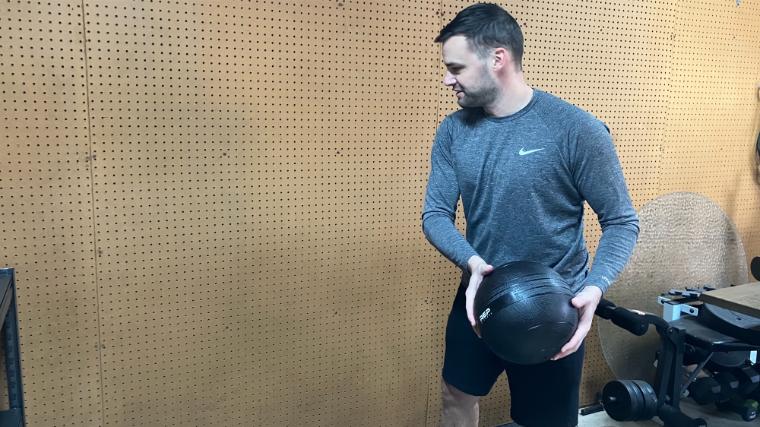
This slam ball held up during overhead slams, Russian twists, and wall tosses, while I noticed the shifting of the sand added just a bit more challenge. For example, when I rotated laterally during a Russian twist, my core muscles got a little extra work because they had to account for that shifting sand inside the ball.
As someone whose hands tend to get a bit more — OK, a lot more — sweaty than average during a workout, I worried that this slam ball would slide out of my grip pretty quickly. I tend to prefer a more rigid grip, but the six small grip rings that circle the ball helped. I also agreed with another one of our testers — a USA Olympic weightlifter — who remarked, “It has a very slight texture, but I was surprised how grippy it felt.”

We appreciated that REP’s slam balls are available in 5-pound increments, compared to other brands that offer 10. Although the heaviest option comes in at 70 pounds — 80 pounds less than the heaviest of other brands — the weight range of these balls should satisfy the majority of athletes looking to practice explosive movements.
Most Versatile Slam Ball: Titan Fitness Rubber Tread Slam Ball

This slam ball is typical in design but its dead bounce makes it a great choice to train aspects other than strength like range of motion, hand-eye coordination, and speed.
Specs
- Price of 20-pound ball: $44.99
- Weight options: 10, 20, 30, 40, 50, 60, 70, 80, 90, 100, 150lbs
- Diameter: 10” to 14”
- Materials: Rubber tread shell, sand
Pros
- With a range from 10 to 150 pounds, most athletes can find an option to suit their training.
- The tread exterior can provide extra grip when the ball gets sweaty.
- These slam balls have very little bounce.
Cons
- Some athletes performing exercises like plyometrics may want a slam ball with more bounce.
- The rigid texture may feel too bumpy for those used to a smooth exterior.
- Black is the only color option on offer.
With the widest weight range of any slam ball we have trained with — up to 150 pounds — this offering from Titan Fitness is our pick for the most versatile slam ball. I tested a ball with a grippy rubber tread, but Titan also offers balls with a more classic, smooth texture. While I was content to train with the 20-pound option, another one of our testers — a USA Olympic weightlifter — eloquently described the 150-pounder as “a doozy.”
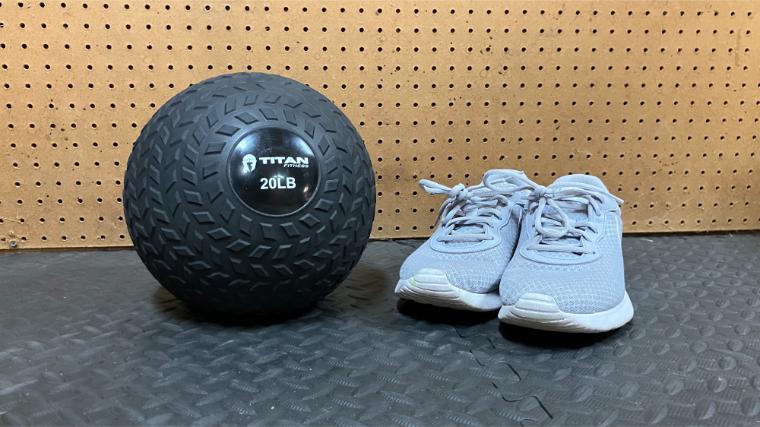
As someone whose hands tend to sweat a bit more — a lot more — than most during workouts, I especially appreciated truncated ridges on the shell. I rated its grip 5 out of 5 because I prefer those larger ridges compared to the triangle or lightly-textured options I’ve used. Even during fast-paced overhead slams, the grip made it easy for my slippery fingers to scoop it back up, and the dead bounce certainly helped, too.
For a movement like an overhead slam, too much bounce would send the ball back up toward your chest, forcing you to bend your elbows up for the catch, while your momentum is still carrying down. Our other tester also noted its lack of bounce. “I really appreciate a good dead bounce and this one felt great slamming down.” Of course, this could be a negative for plyometrics exercises, where you want a bit of bounce, so consider what kind of slams you’re going to be putting this fella through before picking it up.

Although its aesthetics earned just a 3.5 out of 5 from our tester, neither they nor I put much stock in the curb appeal of our fitness equipment. Across all ten categories, this was the only rating under 4 out of 5, including its overall value. “It feels like it’s going to last a long time, and at this price point, it brings a lot of value,” they said.
Most Durable Slam Ball: Fringe Sport Slam Ball

Its tough rubber shell and seams are backed by Fringe’s No-Questions-Asked Satisfaction Guarantee and full one-year warranty. With weight options up to 150 pounds, even the strongest lifters can find a ball that works for them. The lightly-textured exterior is suited for those who prefer a classic slam ball feel.
Specs
- Price of 20-pound ball: $45
- Weight options: 6, 10, 15, 20, 25, 30, 40, 50, 60, 80, 100, 150lbs
- Diameter: 9” to 15”
- Materials: Rubber shell, sand
Pros
- The tough rubber shell and seams are backed by Fringe’s No-Questions-Asked Satisfaction Guarantee and full one-year warranty.
- With weight options up to 150 pounds, even the strongest lifters can find a ball that works for them.
- Its lightly-textured exterior is suited for those who prefer a classic slam ball feel.
Cons
- We’ve noticed several weight options often going out of stock on Fringe’s website.
- Those whose hands tend to sweat a lot may prefer a more rigid grip.
You can spot a low-quality pair of jeans by shoddy stitching, and the same is true of slam balls. If one splits open and turns your home gym flooring into a beach, it’s likely to be due to a weak or frayed seam. The Fringe Sport Slam Ball is our pick for the most durable slam ball because its stitching was so flush against the tough rubber exterior that I could barely feel it when running my finger across it. After slamming, dunking, or chucking it across several weeks, it became clear why Fringe stamped it with their No-Questions-Asked guarantee.

For durability, I rated this slam ball 5 out of 5 because, while less-durable slam balls may begin to lose their shape after years of slamming, I feel confident that its lightly-textured rubber build will last for years. While some athletes prefer a more rigid grip, smoother options with less grip may also be better for advanced lifters, as they can help you train your grip and increase the difficulty of the exercise. Anyone looking for a classic slam ball feel may find its texture just right.
One element of its light texture is the six small grip rings around it. For me, this wasn’t quite enough, so I rated its grip 4 out of 5, as I typically need a tread or triangle-patterned grip. My hands tend to sweat a decent amount as I get deep into a workout, so even though I never felt like the ball would slip out of my hands, I did need to pause to wipe them and the ball several times.
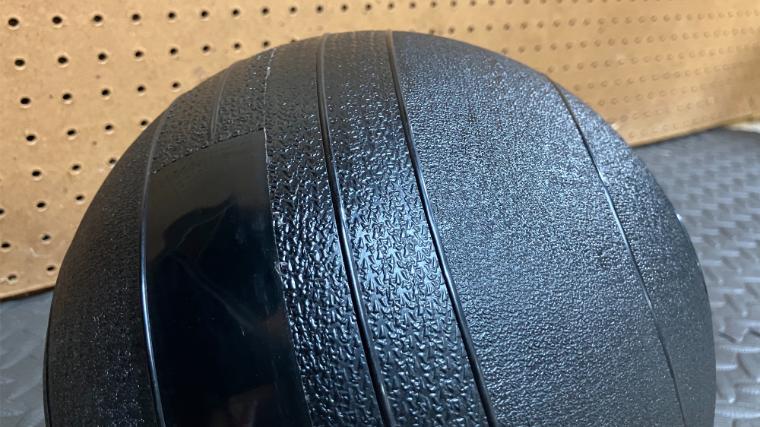
The 150-pound ball in this set is among the largest we’ve seen, so for optionality I scored it a 5 out of 5. That said, several of Fringe’s 12 weight options were out of stock when I checked. Maybe you’ll have better luck.
Best Slam Ball on Amazon: Yes4All Slam Ball

All seven weight options are eligible for free Prime shipping, as well as Amazon’s 30-day Return, Refund, or Replacement policy. Yes4All offers black, blue, orange, and teal options, as well as both tread and triangle grips.
Specs
- Price of 20-pound ball: $30
- Weight options: 10, 12, 15, 20, 25, 30, 40lbs
- Diameter: 9.6” to 11.8”
- Materials: PVC shell, sand
Pros
- All seven weight options are eligible for free Prime shipping, as well as Amazon’s 30-day Return, Refund, or Replacement policy.
- Yes4All offers black, blue, orange, and teal options, as well as both tread and triangle grips.
- Our testers were impressed with the quality PVC build.
Cons
- While some may prefer the rigid, triangle grip, those looking for a smooth, classic feel will need to look elsewhere.
- Although we felt they were durable, some users reported that theirs have broken down over time.
Though at times — not always, Mr. Bezos! — Amazon can be somewhat of a crapshoot with mysterious sellers and reviews, Yes4All has established itself as a brand selling affordable and dependable products — like slam balls. Constructed from high-quality PVC that impressed our tester — a USA Olympic weightlifter — all seven of Yes4All’s weight options qualify for Prime shipping and are backed by Amazon’s 30-day Refund, Return, or Replacement policy. As an owner of a few Yes4All kettlebells, I have confidence in this brand’s quality.

“Considering the price, this slam ball is an incredible value,” our tester said. “I wasn’t expecting much in terms of durability, but was pleasantly surprised by the construction.”
Both of us rated its durability 4 out of 5. We also scored its value 5 out of 5, as the least expensive 20-pound option is nine dollars less expensive than the same weight from other brands that we tested. Eighty percent of the 12,000+ reviews on Amazon were five stars, but a few users reported that theirs broke down relatively quickly. One said “I bought this product three months ago and the ball has broken and now is not usable.” However, our tester and I both found ours to be durable and think they will hold up.
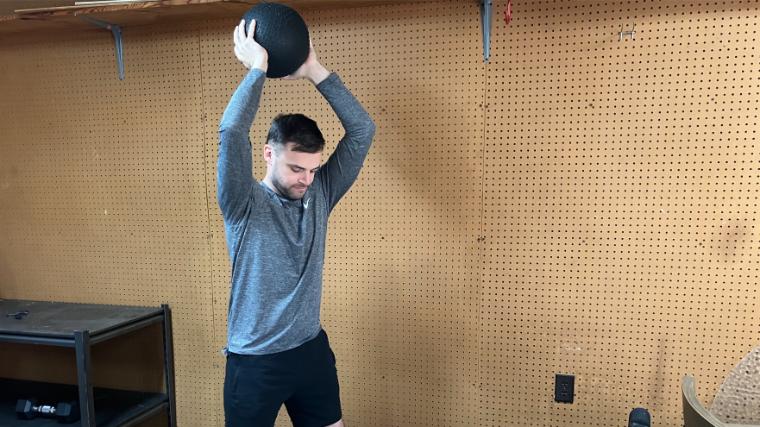
While the balls cap out at 40 pounds, there are multiple colors and grips available, prompting a 5 out of 5 for aesthetics from our tester. “You don’t typically see this many color options, so that was a nice touch, especially for someone building out a home gym.”
I used the black 15-pound slam ball with a triangle exterior for two weeks, rating its grip 4.5 out of 5, only docking a half point because the sweet spot for me is a tread grip. Thankfully, Yes4All also offers that option.
Best Slam Ball for Grip: TRX Slam Ball

With nine weight options up to 50 pounds, the rigid tread on these slam balls allow for solid grip even when the ball gets sweaty.
Specs
- Price of 20-pound ball: $38.99
- Weight options: 6, 8, 10, 15, 20, 25, 30, 40, 50lbs
- Diameter: 9.6” to 11.8”
- Materials: PVC shell, sand
Pros
- The rigid tread allows for solid grip even when the ball gets sweaty.
- Even after powerful slams, there was very little bounce.
- At $38.99, the 20-pound option is about $6 less expensive than most other options we tried.
Cons
- Anyone who needs an option heavier than 50 pounds will need to keep looking.
- Because there is almost no bounce, some modes of training — like plyometrics — may require a different ball.
Ah, my favorite grip. Among the slam balls I have used over the years, I’ve seen lightly-textured smooth grips, triangle-patterned grips, and tread grips (imagine a tire tread). As someone with sweatier-than-average hands — just ask my middle school girlfriend — I prefer the rigid grip afforded by a tread exterior and that is what made the TRX Slam Ball our pick for the best slam ball for grip.

Perhaps unsurprisingly, this slam ball earned a rating of 5 out of 5 for its grip from yours truly. I would also venture that most athletes doing fast-paced overhead slams or a rollover push-up would appreciate the texture on this slam ball. Smoother grips tend to feel slippery in my admittedly sweaty hands, but I never had a doubt with the TRX slam ball.
While a dead bounce like this is ideal for certain exercises like the wall tosses I tried, some may require a little more bounce, so make sure you consider what types of workouts you want to accomplish. I scored its optionality 4 out of 5 because, although some people may not need anything heavier, the heaviest option from TRX (50 pounds) comes up 20 pounds shy of most other brands.
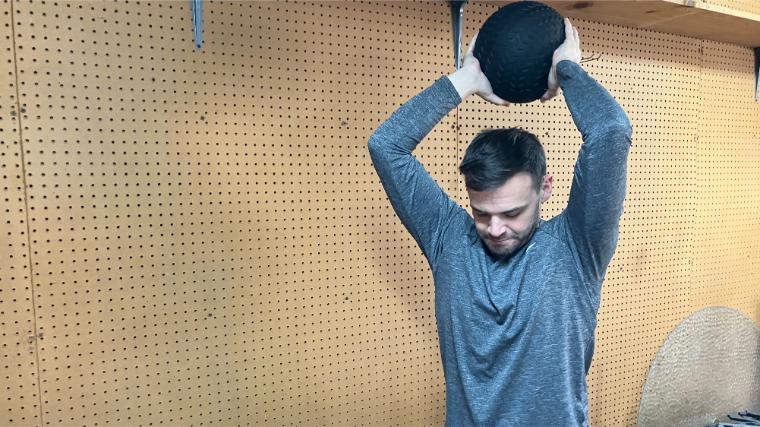
In terms of value, I gave this slam ball a score of 5 out of 5, especially in the context of others I have used. The 20-pound variety comes in around $6 less than many of the other slam balls we tested, so even if you needed to snag another weight, it might be manageable budget-wise.
Best Budget Slam Ball: Living.Fit Slam Ball

Living.Fit slam balls are made to use every day without fail. The dense rubber shell is filled with sand to prevent rolling and bouncing while the textured outer layer gives a solid grip even when sweating during rigorous workouts. They’re available in weights from five pounds to 100 pounds with diameters from nine inches to 13 inches.
Specs
- Price of 20-pound ball: $47.99
- Weight options: 5, 10, 15, 20, 25, 30, 35, 40, 45, 50, 60, 70, 80, 90, 100lbs
- Diameter: 9” to 13”
- Materials: Rubber shell, sand
Pros
- Compared to some other slam balls we have tried — up to $80 for a 20-pound ball — we think Living.Fit is the highest quality for its price.
- The triangle-textured shell provides a rigid grip.
- Its dense sand filling allows for very little bounce.
Cons
- Athletes looking to improve grip strength may find the textured outer shell makes gripping too easy.
- While the 100-pound may be enough for most users, some may want a heavier option.
With a 2-year home use warranty and reasonable pricing across its weight range, the Living.Fit Slam Ball is a BarBend favorite. Given the price range — $29.99 to $174.99 — unique triangle texturing and dense sand filling, we think it’s great value. Compared to the 100-pound option from Fringe Sport ($220), the same weight in this set comes in at $175. The Living.Fit Slam Ball earned high praise from our tester — a USA Olympic weightlifter — whose score for overall rating and value were both 4 out of 5 or higher. “At this price point, the Living.Fit ball is a great item,” they said.
BarBend’s expert product tester and certified nutrition coach Jake Herod agreed. “I’ve been using it for a while now and really appreciate all the different buying options and the way it’s designed to absorb impact without bouncing much.” See what else Herod had to say about the Living.Fit Slam Ball, including how it felt performing Russian twists and overhead slams, in his video review below.
A lot of slam balls have a smooth exterior texture, but the triangle grip and dead bounce both earned a rating of 5 out of 5 from our tester. “I thought the triangle texturing made for a comfortable grip, and there was just enough bounce to catch after slamming it — exactly what you want.”

Being available in 5-pound increments also makes them more accessible for more people, as you’ll be able to zero in on the weight that suits your specific needs. Though we have seen options up to 150 pounds from other brands, our tester felt that the 5- to 100- pound range was more than enough for most people. Just keep in mind that heavier weights can be useful for exercises like shoulder throws or carry variations.
The only area to earn less than a 5 out of 5 was its aesthetics — 4 out of 5. “Apart from the triangle tread, it won’t be that eye-catching in your gym.” But at this price point, we felt that its durability and 2-year warranty give it a lot of value.
Read our full Living.Fit Slam Ball review.
Benefits of the Best Slam Balls
Slam balls are generally used for two main reasons — improving body conditioning and increasing power. Certified personal trainer and BarBend editorial member Kate Meier has been adding slam balls to her clients’ regimens for years. “As a weighted implement, the slam ball is fantastic for building strength and muscular endurance. It can be used for the classic slam ball exercise as well as deadlifts, presses, and rotational core exercises.”
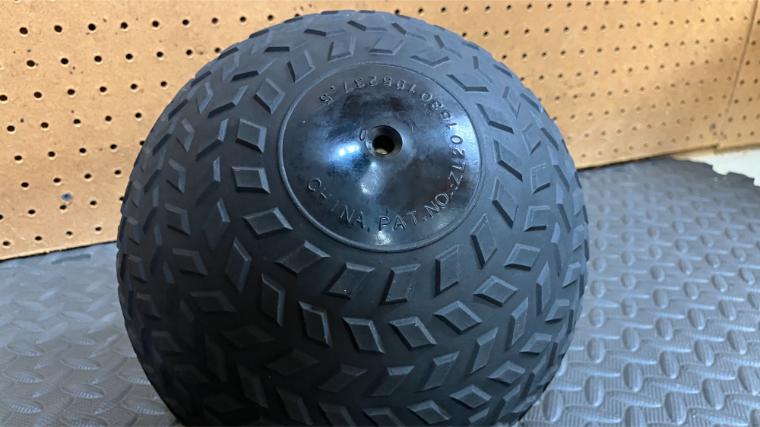
These versatile tools are an easy way to add resistance and weight to dynamic movements like Russian twists or sit-ups. With a slam ball and a little creativity, you can complete a full-body workout with an emphasis on explosive power and conditioning. Check out a few of the benefits of adding a slam ball to your workout.
Increased Instability During Bodyweight Movements
Because most slam balls are filled with sand, they are unevenly weighted. Compared to the best dumbbells or kettlebells, the movement of the sand is unpredictable and different muscles — like the core or forearms — need to react to stabilize the shifting sand filling. Many people employ the use of slam balls for core training with exercises like rotational slams, sit-ups, and even hanging knee raises.
Increasing Power
Because slam balls won’t bounce much — if at all — when you toss them against a wall or the floor, you can exert maximum effort with each throw or slam. Imagine doing some wall balls with a basketball. As the air in the basketball would make it bounce back, less force would be required in each throw. Performing movements like chest passes or overhead throws can help increase explosive power, because you can throw it as hard as you can without fear of it bouncing back at you. (1)
Improving Conditioning
Whether it’s conditioning for weightlifters or the average Joe, repetitive work with lighter slam balls can improve stamina. Certified personal trainer Kate Meier laid out how she uses them to boost the intensity for her clients, saying, “Anyone who has done slam balls for even just 30 seconds knows how quickly your heart rate becomes elevated. I love working slam balls into circuits with my clients for that reason.”
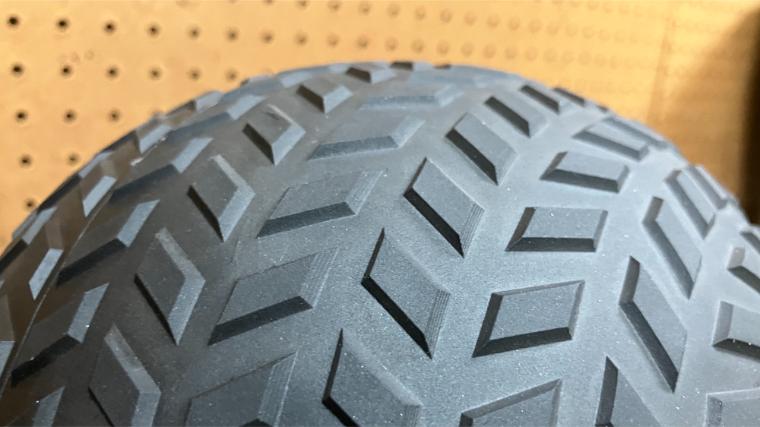
Slam balls are also an easy way to build core strength with exercises like Russian twists or V-sits. For improved conditioning and endurance, these are commonly used to increase the intensity of bodyweight movements like rollover push-ups.
How Much Do the Best Slam Balls Cost?
Slam balls have a low barrier to entry when it comes to price, but the costs can add up rather quickly — much like the best weight plates and dumbbells. A 5 or 10-pound slam ball won’t put a big dent in your bank account, but if you’re interested in picking up a set of them, you’ll be making a more significant investment of a few hundred dollars.
| Best Overall Slam Ball | REP Fitness Slam Ball | $24.99 to $119.99 |
| Most Versatile Slam Ball | Living.Fit Slam Ball | $24.99 to $174.99 |
| Most Durable Slam Ball | Fringe Sport Slam Ball | $35.00 to $320.00 |
| Best Slam Ball on Amazon | Yes4All Slam Ball | $20.99 to $52.90 |
| Best Slam Ball for Grip | TRX Slam Ball | $28.99 to $99.99 |
| Best Budget Slam Ball | Titan Fitness Slam Ball | $39.99 to $289.99 |
Lighter slam balls (roughly 5 to 20 pounds) cost around $30 to $50, while heavier options generally cost more (about $60 to $150). Some companies make products that are like slings that can transform medicine balls into slam balls with a handle, and those are usually priced somewhere around $50.
What to Consider Before Buying the Best Slam Balls
While many slam balls can serve similar purposes, different weights and grips can be best suited for different experience levels and training purposes. Here are a few factors to consider before buying a single slam ball or a whole set.
Experience Level

Also, stronger athletes may need a slam ball with less bounce due to the amount of force imparted on the ball. For instance, I’d probably want a ball with a bit more bounce than my Olympic weightlifter colleague (he’s stronger than me…)
Bounce vs. Dead Bounce
When you’re checking out different options for your training, consider how much you’ll need your slam ball to bounce. For instance, for core training movements like a Russian twist, you wouldn’t necessarily need a ball with a bounce. But for partner drills like a slam pass, you might want to look for an option with some bounce, so it can return to you or bounce to your partner more easily. Along the same lines, for an overhead slam, too much bounce would send the ball up into your chest, forcing you to raise your arms up for the catch, fighting the downward momentum from the slam.
Weight Variety
Like dumbbells and kettlebells, slam balls are available individually or in sets. Adding hefty weight to dynamic movements like a burpee can help build strength, as well as improving your speed and mobility. Lower weights work well during speed and reaction drills while also benefiting rotational exercises, like halos or a wall side toss.

[Read More: The Best Ab Exercises & Workouts, According to a CPT]
Heavier weights are useful in exercises like shoulder throws or carries. Before choosing a set or individual slam ball, make sure that weight will support your fitness goals. Some brands carry standard sizes ranging from five pounds to 50 pounds, while others can reach up to 150 pounds.
Price
While smaller fitness equipment like slam balls are more affordable than the best home gym machines or squat racks, the costs can add up. A 10-pound slam ball can cost around $20 to $30, but as the weight increases, so does the price. When you’re reading about each option, check for an included warranty, as this usually means the company is confident their ball is durable and strong enough to withstand any type of slam.
What Are Slam Balls?
Whether they’re being passed to a partner, tossed against a wall, or slammed into the ground, slam balls are constructed to endure high impact. Their tough shells are usually made of rubber to withstand any surface and allow for better grip during catch-and-release drills. Combine that outer shell with a sand or gel filling, and you have a ball that doesn’t bounce or ricochet onto your face.
Slam Balls vs. Medicine Balls
Some people make the mistake of using medicine balls as slam balls and only realize the error when it’s already too late — the medicine ball has popped and the gym owner is asking them to clean up the sand that has spread all over the mat.

While some slam balls can be used for medicine ball exercises, medicine balls cannot always be used for slam ball exercises. While some are made of rubber, most are made of leather, vinyl, or plastic. After consistent slams to any surface, even some of the best medicine balls can start to tear apart and deflate. Medicine balls are best used for tosses and partner drills since they’re softer.
An easy way to remember which type of ball to use during your exercise is to consider if it involves propelling the ball with intense force or not. If so, choose a slam ball. It’ll not only be the correct tool for your high-intensity workout, but it’ll also save you from having to buy another ball sooner than later.
Final Word
Compared to other types of fitness equipment that have evolved with new technology, the slam ball hasn’t changed much in the decades since it became a favorite of CrossFit and functional fitness athletes — I mean, it would be hard to graft an HD touchscreen on a rubber ball full of sand. But that hasn’t changed how effective they are for increasing the intensity of bodyweight exercises, while building strength and muscular endurance.
For being such effective tools in any athlete’s toolkit, most are affordable and versatile, with some optionality that can meet most people where they are on their fitness journey. With smooth, triangle, or tread grips, and weight ranges from 5 to 150 pounds, we tried some of the best slam balls on the market to bring you quality options from brands we have trusted for years. If you’re ready to spice up your training and take out some frustration on your walls, floors, or training buddies — be gentle with your buddies — slam balls are a fun way to ramp up any workout.
FAQs
What is the best slam ball?
The REP Fitness Slam Ball is our pick for the best overall slam ball because of the classic feel afforded by the lightly-textured surface and high-quality, durable rubber shell. The one-year home use warranty also indicates that REP believes in its products and our testers think it can bring long-lasting value to your strength training.
What is the best weight for a slam ball?
Generally you’ll want a slam ball that you can use for explosive movements in the range of 10 to 15 reps. For most folks, a versatile slam ball around 25 to 40 pounds can allow for a lot of variety in your slam ball workouts. Experienced athletes may want to shoot for a higher range of weight, while beginners could start out with lighter slam balls.
Are slam balls worth it?
Considering their low entry point — around $25 to $30 for lighter options — slam balls are generally a good value, especially given their versatility in developing explosive power. Throwers use them for overhead tosses or chest presses. Softball and baseball players may use them to develop their swing with rotational wall throws. You can even use them as added weight for other exercises, such as overhead lunges, russian twists, or squat jumps. (2)
How much do slam balls cost?
Much like weight plates and dumbbells, slam balls start out relatively inexpensive and become more costly as the weight increases. You can pick up a light, 5-pound slam ball for roughly $30, while the heaviest slam balls — we’ve seen options up to 150 pounds — can cost up to $320.
References
- Ignjatovic, A. M., Markovic, Z. M., & Radovanovic, D. S. (2012). Effects of 12-week medicine ball training on muscle strength and power in young female handball players. Journal of strength and conditioning research, 26(8), 2166–2173.
- Szymanski, D. J., Szymanski, J. M., Bradford, T. J., Schade, R. L., & Pascoe, D. D. (2007). Effect of twelve weeks of medicine ball training on high school baseball players. Journal of strength and conditioning research, 21(3), 894–901.